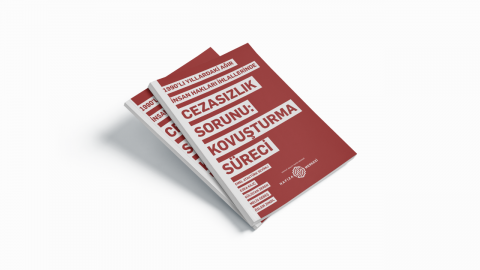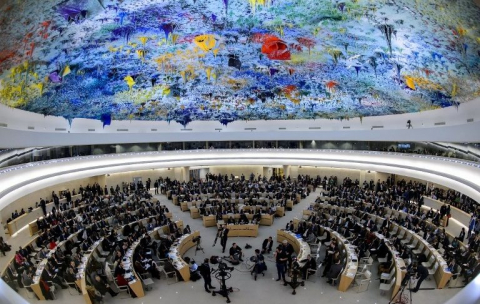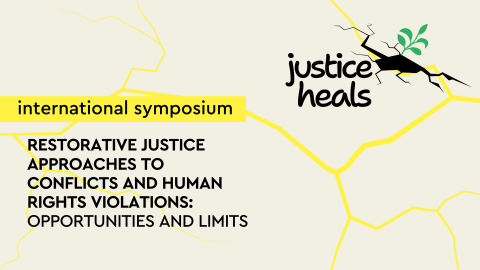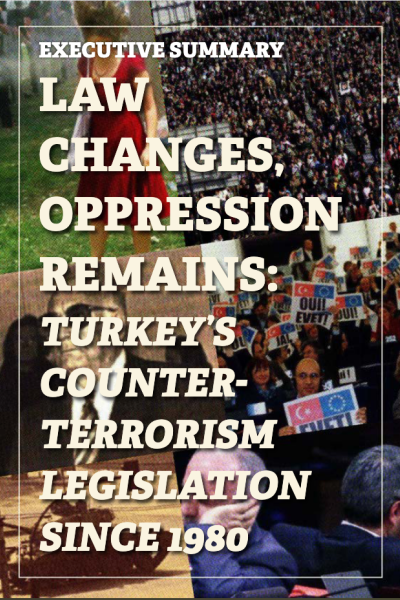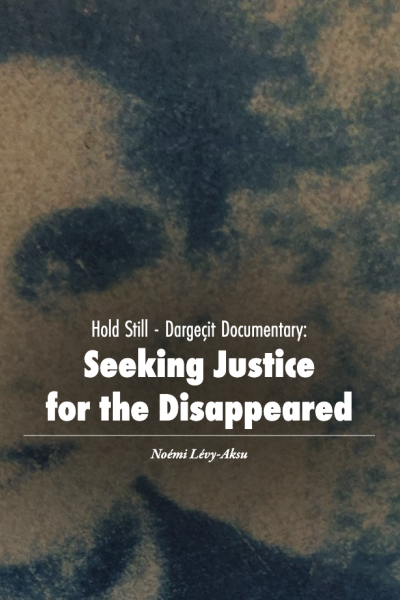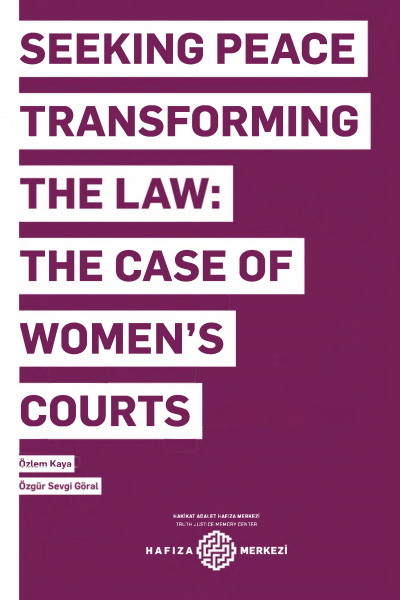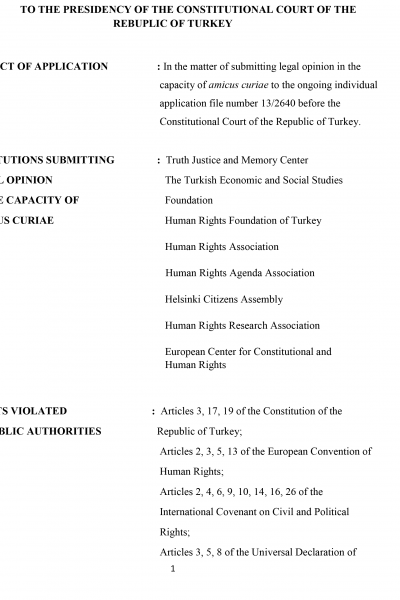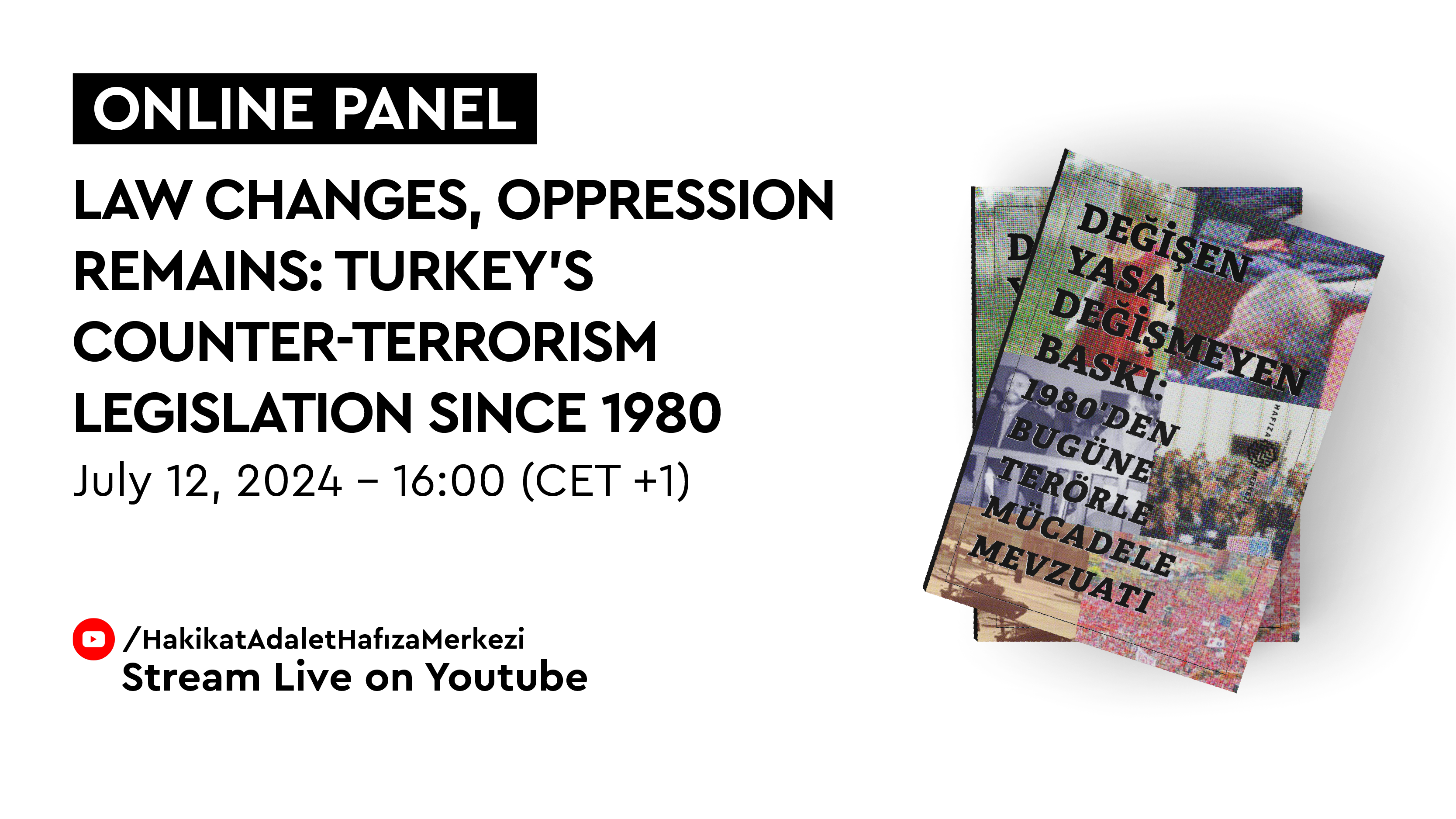
Online panel to discuss our new research, “Law Changes, Oppression Remains: Turkey’s Counter-Terrorism Legislation since 1980”
Law Changes, Oppression Remains traces Turkey’s counter-terrorism legislation, which has been at the root of the repression against dissenting voices in Turkey since 1980. Taking the September 12 military coup d’état as a milestone, the research examines the political climate leading up to the drafting and enactment of Turkey’s Anti-Terror Law (TMK), which entered into force in the spring of 1991. The study then chronologically examines how different rights movements were criminalized by its implementation and how laws were instrumentalized to enable systematic judicial harassment in the period following its enactment.
Pursuing the evolution of Turkey’s so-called “counter-terror legislation,” the research evaluates other components of the legal corpus used to implement securitization policies and the repression of the civic space, including legislation other than the Anti-Terror Law, such as Articles 216 and 301 of the Turkish Penal Code.
The main purpose of this publication is to examine the transformation of the concept of “terrorism” in Turkey, one of the most important obstacles to Turkey's becoming a democratic country that upholds universal legal values and respects human rights and liberties. This study also looks at the impact of judicial reforms and legal amendments in practice and presents the controversial dimensions of the issue through specific cases. In order to reveal the persistence of the phenomenon of the “fight against terrorism” in the legislation, the research divides the past forty years from 1980 to the present day into different periods, thus providing a comprehensive historical overview of the counter-terrorism legislation.
During this week’s online panel, we will follow this historical trajectory and discuss how counter-terrorism legislation continues to preserve its essence despite judicial reforms it has undergone, from the perspective of those it targets.
Context
As Hafıza Merkezi, we have been monitoring the repression against rights defenders and carrying out solidarity activities against these repressions since 2018. This work, which we publicize through SessizKalma.org (Keep the Volume Up in English), revealed that counter-terrorism legislation is used as a “convenient instrument” for judicial harassment of rights organizations and rights defenders. In our previous publication that stemmed from this monitoring work, we aimed to take a snapshot of the intimidation policies against rights defenders between 2015 and 2021 and concluded that “the legislation in force, especially the counter-terrorism and national security laws, is applied with mal intent.” We hope that Law Changes, Oppression Remains, which we have prepared following the footsteps of this observation, will be instrumental in discussing “the fight against terrorism” phenomenon, which is one of the most important obstacles to Turkey’s becoming a democratic country that respects universal legal values and human rights and liberties.
Discussants
Ali Duran Topuz graduated from Istanbul University Faculty of Law. After completing his education, he worked as a lawyer for a while before turning to journalism in 1994. He is still registered with the Istanbul Bar Association. He spent 17 years of his professional life at Radikal newspaper, where he held various positions. Between 2016 and 2021, he was the editor-in-chief of Gazete Duvar, where he was one of the founding editors. After leaving Gazete Duvar, he started writing for Artı Gerçek and has been its editor-in-chief since 2022. Topuz also publishes poems, stories, and literary criticism in various literary magazines and most notably writes on minority rights and contemporary political issues.
Eren Keskin graduated from Istanbul University Faculty of Law in 1984. In 1989, she became a member of the Human Rights Association (İHD), where she served in managerial positions for many years. Keskin is currently the co-chair of the association. In 1995, she was imprisoned for six months for using the word “Kurdistan” in an issue of the Özgür Gündem newspaper. She was a witness to the experiences of women who were subjected to sexual harassment and rape in detention during this time. After this experience, she founded the Legal Aid Office against Sexual Harassment and Rape in Custody. From 2013 until 2016, when it was shut down by a state of emergency decree, she worked as the managing editor of Özgür Gündem newspaper. She has been sentenced to a total of 26 years and 9 months in prison for the articles published in the newspaper during this period and has been banned from leaving the country for the past eight years.
Nuray Özdoğan graduated from Ankara University Faculty of Law in 1998. She is a member of the Human Rights Association (İHD), the Association of Lawyers for Freedom (ÖHD), and the Association of Progressive Lawyers (ÇHD). She also served as the co-spokesperson for the Law and Human Rights Commissions of the People’s Democratic Party (HDP) and the Peoples' Equality and Democracy Party (DEM Party). Özdoğan continues her work with DEM Party’s Legal Commission and ÖHD. Özdoğan took an active role in various human rights cases in Turkey, notably in high-profile cases such as the October 10 Ankara Massacre Trial, JİTEM Ankara and Kızıltepe Trials, Vartinis Massacre Trial, and most recently the Kobanê Trial. Her articles on the problems of fair trial and human rights violations in these cases were published in the media.
Serdar Tekin completed his PhD in political theory at the University of Toronto. He was dismissed from the Department of Philosophy at Ege University, where he was working as a lecturer, with a state of emergency decree for signing the petition titled “We will not be a party to this crime!”, commonly known as the Peace Declaration. His publications include Founding Acts: Constitutional Origins in a Democratic Age (University of Pennsylvania Press, 2016) and State of Emergency of the Universities: A Study on the Destruction of the Academic Environment (Human Rights Foundation of Turkey Publications, 2019). He currently serves on the editorial board of the journal Toplum ve Bilim and works as a researcher at the Human Rights Foundation of Turkey (TİHV).
